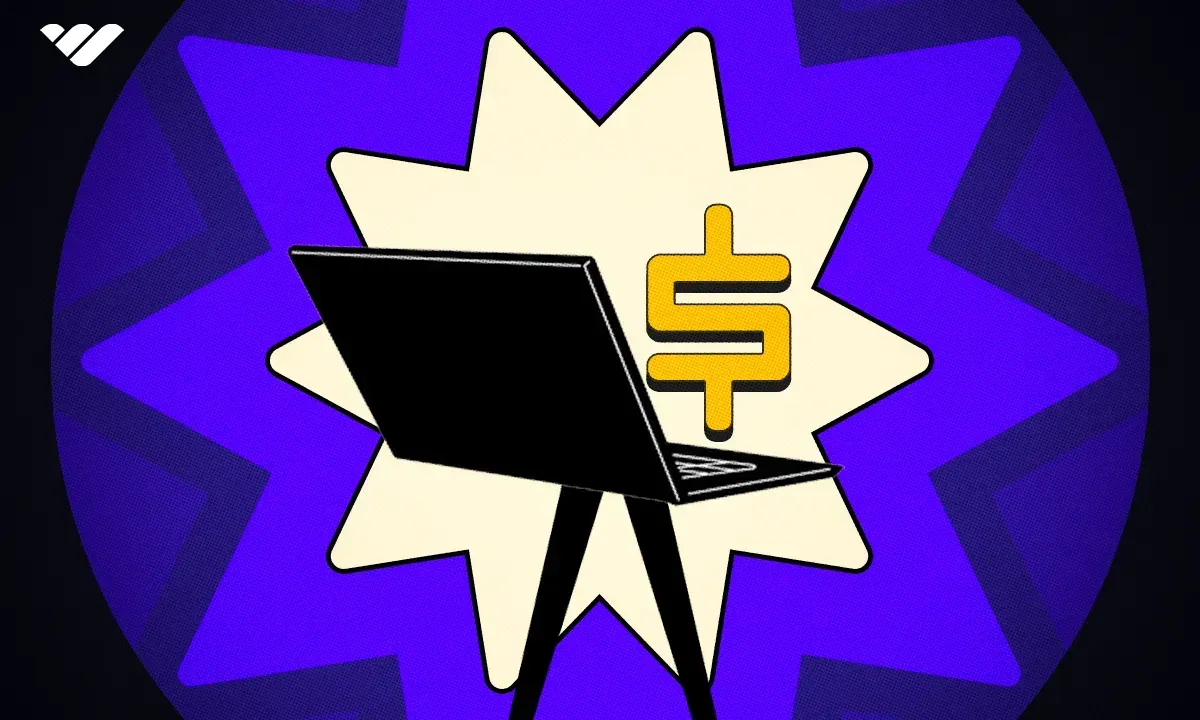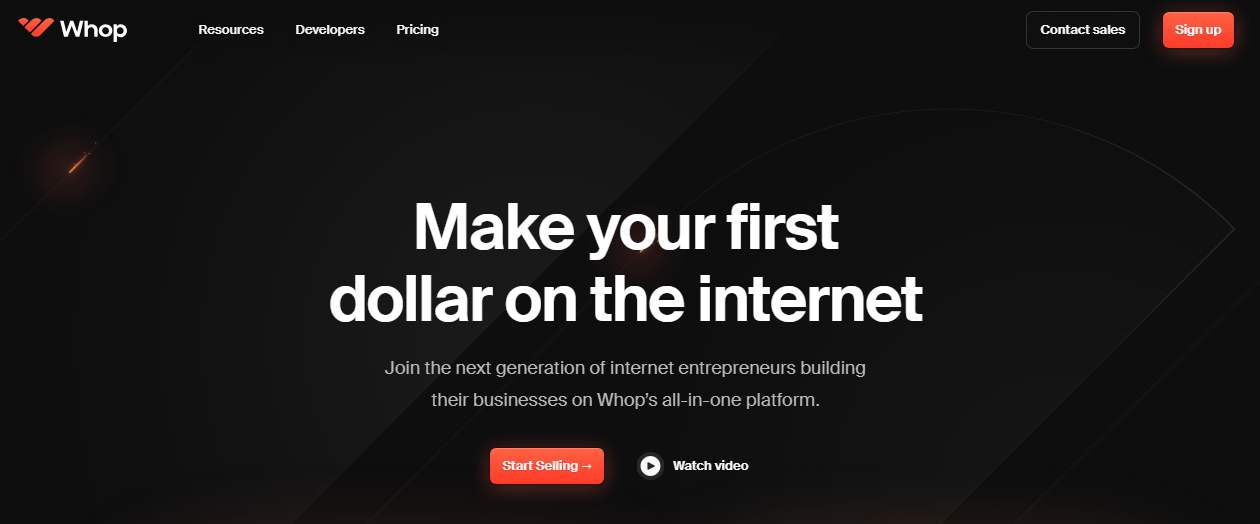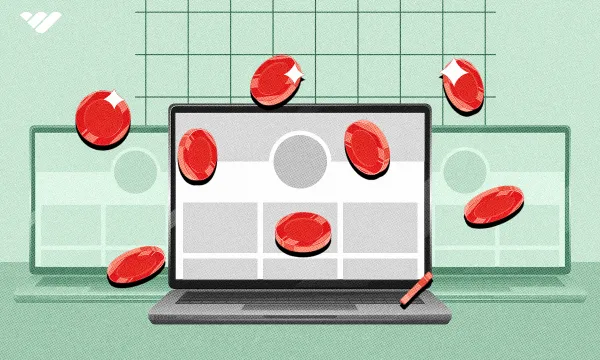Making money online is the dream for many, and with a variety of options and business models out there, the choices can prove to be overwhelming.
One of the best ways to make money online is through having your own website. This can open the doors to a diverse stream of income, including the ability to bring in revenue from advertising, products, and even the option to cash in by selling your website.
In this guide, we’ll break down how you can make money with a website in 20 different ways in addition to revealing expert tips for monetization and the quickest way you can launch a website.
Can you really make money with a website?
Before we jump in with the exact methods that you can use to monetize a website, let’s clarify that it is not only possible to make money with a website, it’s very doable with the right knowledge and strategy.
In fact, making money with a website that you create yourself is better than making money on a social platform. With social media, you don’t truly own your audience and no matter how big you get, you still have to worry about potentially getting banned if you’re using a platform like Instagram, TikTok, or YouTube.
Additionally, a website will offer you more control to monetize in more diverse ways compared to a social media platform. If you lay the foundation and monetize correctly, your website will become a piece of digital real estate online and can thus be sold as an asset to an investor.
We’ll give you some expert tips on how to quickly launch a website and efficiently monetize it later in this guide, but first, let’s give you some inspiration by letting you know all the different ways you can make money with one.
20 ways to make money with a website
Here are 20 ways that you can cash in as a website owner. We included some examples of how a making-money website might look:
1. Sell digital products
One of the biggest gold rushes of today in online money is the world of digital products, and while there are many platforms and public marketplaces that you can use to sell them, doing so on your own website is one of the best ways to cash in.
The great thing about selling digital products is the incredible diversity that this category offers. This means you can sell anything from video courses to ebooks to software. While you can sell these on public platforms like eBay or Amazon, these can sometimes be restrictive and also expose you to competition, so you’re best off if you sell these on your own website.
2. Affiliate marketing

Affiliate marketing is one of the most popular ways to monetize a website, and for good reason. With affiliate marketing, you get paid a commission to promote someone else’s brand, so there’s no need to create your own product. To track the sales that come from you, you’ll get a unique affiliate link.
Most affiliate network platforms such as Clickbank and Amazon will require you to have a site to use for promotion. You’ll likely need to make a website you can then monetize with affiliate marketing and combine that with other methods in this list.
3. Ask for donations
If you’re consistently providing valuable content on your website, your audience might be willing to support you through donations. You can use your website to direct people to platforms like Patreon and GoFundMe, or even ask for direct donations with something like a PayPal button on your website.
The key to successfully soliciting donations is to develop a high level of rapport, trust, and loyalty before asking, and let your audience know exactly why they’re donating and what goal you’re trying to achieve. You should also offer exclusive content in addition to other perks to help incentivize support and show gratitude to everyone contributing.
4. Sell leads
Lead generation can be incredibly profitable and fairly simple if you set up the right type of website and are in the right niche. This works by setting up a simple site that often just involves a landing page with a contact form in addition to some information surrounding the niche. Once you’ve got leads, you can direct them to companies in your niche and charge a finder's fee, something that many businesses are happy to pay.
One good method to get leads for free is to utilize the power of SEO and rank for keywords in your target niche. For example, you can set up a website about home improvement and sell these leads to local contractors. Legal, medical, and financial services are particularly lucrative niches for lead generation.
5. Offer consulting services
A website can be an excellent place to showcase your expertise and attract clients for consulting. Using a custom-designed website will be seen as more professional than simply soliciting people directly from your social media platforms, so take the time to make your website look good.
You’ll need to start by gaining trust and establishing yourself as an authority. This can be done by creating informative blog posts on your website or posting content regularly on social media to educate your audience and give incentives for them to sign up for your services.
The consulting needs to align with your previous expertise and can be in many fields, including marketing, business strategy, or even personal coaching.
6. Advertising revenue

One website monetization strategy that has been around since the early days of the internet is advertising revenue. This method allows for true passive income as you simply need to input ads into your site, something that many advertising networks can do for you automatically.
However, keep in mind that most advertising networks will require a minimum threshold for monetization in terms of overall traffic and pageviews, so you’ll need to lay the foundation to reach these minimums before you can be approved to serve ads.
When advertising on your website, make sure you’re not interrupting the user experience too much–pay attention to metrics like bounce rate and page session duration when tweaking your settings. This way, you can see if a certain number of ads is compromising the overall user experience and scale down accordingly.
7. Create a newsletter
One of the first things you should do when you make your website is to create an email opt-in, so you can start to build an email list. While it will take some time to build your list to a significant level, doing so will open up the doors to many unique monetization opportunities in addition to enhancing the effectiveness of current ones.
Your newsletter can be monetized in several ways, including premium subscriptions, sponsored content, or direct advertising of your own products.
Make sure to provide substantial value to your audience outside of your newsletter to build the trust and rapport it takes to justify a paid, premium newsletter. You can use an email marketing platform that integrates with your website to make the setup and execution more simple.
8. Review products
In the past several years, an increasing number of companies and consumers have realized the value of authentic product reviews, so the market for these remains a strong pathway to monetizing your website. You can get paid through affiliate commission, flat rate, or sometimes free products in exchange for a well-written review.
Focus on providing detailed, honest reviews that help your audience make an informed decision. If you’re a fan of the product, make it clear exactly what you like about it and why it’s worth buying.
Side-by-side comparisons, list rankings, and in-depth reviews are all good methods to create product reviews and are best done in article format. Make sure you write in an engaging tone and include pros and cons lists to increase reader retention.
9. Sponsored content
As your website's authority grows and traffic increases, selling sponsored content becomes a viable method for making money with your site.
While you might receive inbound requests for sponsored posts or other content, you should take a proactive approach to this monetization method. Your potential collaborators need to be aware of you before they can think about paying you.
Be sure to maintain your credibility as well when doing sponsored content, only working with brands that align with your values and bring genuine benefit to your audience. Stay transparent about which content is sponsored for both overall trust and legal compliance reasons.
10. Sell physical products
Your website can serve as a digital storefront for you to sell physical products. Taking this ecommerce route will open up many specific opportunities, like selling your own creations, dropshipping, or reselling other goods.
While you can build a custom website and integrate ecommerce functionality, it’s simpler to use a dedicated ecommerce platform that has built-in shopping integrations. To encourage a high conversion rate, make sure your website’s content and store products are aligned with your audience.
11. Paywall your content
If you’re producing high-quality, valuable content, consider implementing a paywall for premium articles or features. The best way to do this is to implement a freemium model where some content is free so your audience has a good idea of what they’ll be getting should they decide to pay.
Custom solutions such as Memberpress and Mediapass make gating your content with a paywall easy, but they require a paid subscription to successfully implement. Once you set up your paywall, consider offering different tiers of access to appeal to different audience segments.
12. Sell merchandise
Branded merchandise is another excellent way to make money with your website. This monetization method works particularly well if you’ve built a loyal following that resonates with your brand’s message or aesthetic.
The key to success in selling merchandise is having a strong brand and rapport with your audience so that your customers will genuinely want to wear it.
You’re best off selling merchandise using print-on-demand services such as Printful and Printify. These allow you to create custom merchandise and sell it by dropshipping it, meaning you won’t have to hold or handle any physical inventory to fulfill orders.
13. Create an online course

Selling an online course is one of the most lucrative ways to monetize your expertise with a website. Unlike a basic digital product or ebook, an in-depth online course will command higher prices due to its structured learning format and comprehensive nature.
However, to get to the point of selling a high-ticket online course, you’ll need to establish a reputation that comes with the authority to ask for such prices. This comes with building trust by giving out free content to the public.
Social media platforms like Instagram, TikTok, and YouTube are great places to use short-form videos to give helpful advice that helps you grow your audience and build trust that will let you successfully launch your online course.
Make sure you identify a specific problem that your audience faces and create a course that provides a clear and compelling solution. Offer genuine value that you can showcase with testimonials and results.
14. Sell memberships
Recurring revenue is the holy grail of business, so it’s something that virtually every single billion-dollar company you can think of incorporates into their business model.
Perhaps the easiest way to bring recurring revenue to your web presence is to sell a membership. However, keep in mind that before you do this, you have to be ready to offer consistent value over a long period of time to justify a recurring fee.
You’ll also want to pick a good market. Memberships in the realms of personal finance, reselling, sports betting, and niche ways to make money such as using AI to create a side hustle perform the best. Make sure to check the competition to see what a reasonable rate is. It's also wise to see what is being offered elsewhere in your niche, to see which features a potential customer might expect.
15. Make money with SEO
Search engine optimization (SEO) is a way to make consistent passive income. Strategically crafting content around certain keywords and topics helps you gain organic traffic by ranking in search engines such as Google.
Once you have the base of organic traffic with SEO, your ability to monetize with previously mentioned methods including affiliate marketing, newsletters, and selling any type of product or membership will vastly increase. Additionally, reaching a certain level of traffic will open up the doors to more selective advertising networks that only work with popular websites.
Having SEO knowledge that grows your site to a certain level will also allow you to offer consulting or services to other website owners looking to use similar strategies that worked for you.
16. Create online workshops
Some customers prefer to interact directly with experts in a live format, and by offering online workshops, you can fill this need. It’s best to offer these workshops live, opening up time for Q&A sessions so you can continue to iterate and improve in subsequent workshops. You can record your workshops so they can be sold as an online course in the future.
It’s even possible to launch an online workshop without being the host yourself–if your website has decent authority and reach, you can partner up with an expert in your niche, bring them your audience in addition to theirs, and share the workshop revenue.
17. Launch a marketplace
A marketplace is one of the best business models because you don’t have to create any products, you simply take a fee from anyone that transacts inside of your store. This fee can be taken on the buying side, selling side, or both.
The key to a successful marketplace is a high degree of trust and authority, so this means you’ll be most successful in this realm if you are hyperfocused on a specific niche that overlaps with a reselling market. Watches, trading cards, and other specific collectibles have good potential for making a marketplace.
Keep in mind the larger competition of marketplaces that overlap with your niche, and highlight to your audience the value of transacting inside a more intimate environment. Be sure to thoroughly vet anyone trying to participate in your marketplace so you keep your reputation high.
18. Host online masterminds
Online masterminds are sessions where like-minded individuals can share ideas, hold each other accountable, create goals, and grow together. Everyone knows how difficult it can be to succeed alone in any niche, so the appeal of masterminds is always strong.
In order to succeed with hosting masterminds on your own website, you’ll need to either become an authority yourself or partner with an authoritative figure who is willing to consistently participate in these mastermind sessions.
Schedule different cohorts for masterminds that are limited to a certain capacity and consider having qualifications for enrollment and participation. This keeps motivation and the eventual outcome high.
If you want to learn more about effectively creating and running a mastermind session, check out our guide on How to run a mastermind session on Whop.
19. Sell data or market research

If you run a niche website and have a decent amount of traffic, you’ll likely have valuable data about your industry or niche that can possibly be packaged and sold to other businesses, analysts, or researchers.
It will take some research and specific industry knowledge to know how to price, package, and sell your data, but once you’ve learned this, you can open up an amazing lowkey revenue stream that some of the most profitable companies in the world are using to drive revenue.
However, when it comes to selling data, you’ll need to remain compliant with privacy laws and be transparent to your customers and audience regarding how you collect and use data.
20. Sell your site!
The ultimate website monetization strategy might be taking an exit by selling the whole site itself. While most people are unaware of this fact, an established website is essentially digital real estate and is thus similarly liquid inside of an active niche market.
While you won’t be able to sell your website straight away, if you have a strong history of revenue that is either steady or growing, there’s a high chance that there’s a willing buyer for your website.
Platforms like Flippa and Empire Flippers have buyers coming through daily looking for websites to invest in. Before you go and list your site, make sure to have detailed records surrounding your site’s monetization strategy, as you’ll have to go through a vetting process before you’re even allowed to list.
Before selling your website, you’ll also ideally want to have a team and evergreen process that the buyer can easily take on and continue with. This way, they can get predictable returns with minimal additional effort on top of investing.
What’s the easiest way to make a website?
Launching a website might seem intimidating, especially if you’ve never written a line of code or done anything more complicated than creating a social media profile. While there’s a hard way to make a website by writing it from scratch with code and hosting it yourself, today there are many solutions that require no coding knowledge and aren’t much more complicated than setting up a social media profile.
The easiest way to make a website is to utilize one of the platforms equipped with a website builder. With these, you can create a professional-looking website without needing to write a single line of code.
By using an easy-to-use platform, you’ll greatly reduce the friction and time it takes to launch your site, meaning that you can lay the foundation to get to monetization much more quickly.
Expert tips for website monetization
Many people make a website intending to make money from it but fail to make a consistent income or even anything at all.
Here are some expert tips from those who have successfully monetized a website:
Pick a good platform
Building a website from scratch is not only difficult and time-consuming, but it’s also not necessary today thanks to the myriad of platforms that you can use to build a website.
Choose a platform that’s best for you based on your desired monetization strategy and level of technical expertise. Popular options include Wix, WordPress, and Shopify.
While it’s possible to switch your platform later, making the switch can be complicated and time-consuming. It’s better to pick a good one and grow it from the beginning; take the time to review the functionality, features, and usability so you know you’re starting with a good foundation.
Optimize for search engines
If you want long-term success that is bolstered by the value of ongoing organic traffic, you’ll need to have your website optimized with SEO so it ranks in search engines.
This is something you need to continue from the very beginning of your website’s inception: The platform you use will determine the structure of your site and its overall compatibility to effectively index and rank in search engines, so make sure to check that you’re creating your website with a platform that is SEO-friendly.
From there, use general good SEO practices such as using clean, keyword-targeted URLs, optimized page titles and descriptions, and quality, niche-focused content that is helpful to the reader. Don’t forget that the user experience is a big contributing factor to your site’s SEO potential, so make sure you have a clean design and a site that is pleasant to browse with fast loading times.
Target a good niche

One of the most important components of making money with a website is your chosen niche. Your success largely depends on a niche that has proven demand and sustainable monetization potential.
You should also be aware of current competition in addition to the overall size of your target market. While some competition is good, as it validates market demand, too much competition can make it difficult to stand out and capture a profitable share of the audience, particularly when it comes to SEO.
Certain niches have consistently proven to be more profitable for website monetization. Personal finance websites, for example, can generate significant income through affiliate marketing of financial products like banks and credit cards in addition to a high payout rate for ads.
In addition to the money-making niche, health, wellness, lifestyle, and personal development are also good to target if your expertise and brand align with it.
Each niche will have varying potential in terms of specific monetization chosen, so be sure to research what your audience typically pays for–looking at existing websites within your niche can give you a good idea of what monetization methods might work best.
Consistently create quality content
Quality content is the backbone of any successful website, so make sure you provide real value to your audience for free as a means of building trust and improving your brand’s image. Focus on creating in-depth, helpful content that solves specific problems and speaks in a way that resonates with your audience’s point of view and unique pain points or interests.
To foster growth, it’s important to put out this content consistently so your audience knows they can rely on you as a resource. Maintain a consistent posting schedule, and consider announcing when your audience should expect new content so they know when to come back for more. For example, you can make a weekly newsletter sent every Sunday, or publish blog posts every Tuesday and Friday.
Batch-creating content in advance and then dripping it out on a steady timeframe is a great way to stay ahead and achieve predictable consistency.
Create a process and scale
Once you’ve found what works, it’s crucial to develop a process complete with systems that allow you to scale efficiently if you want to achieve consistent monetization.
Laying the foundation with a solid content creation system is essential. This can include developing unique templates for different types of content, creating standard operating procedures (SOPs) for content creation and output, and sticking to a defined and consistent publishing schedule.
As your website grows, consider building a team to effectively delegate different aspects of the operation. A typical team for a monetized website would include content writers, social media managers, and customer support.
When it comes to delegating, be sure to start small and only delegate when necessary. It’s important to do as many tasks as you can first yourself; learn what works so you can put yourself in the shoes of the staff that you delegate the work to, something that’s essential for effective delegation.
Effective scaling also means being willing to reinvest a portion of your earnings into growth. For as long as possible, try not to cash out on any of your website’s profits, especially in the early days; early reinvesting will promote a solid foundation for compound growth to fuel a sustainable and profitable future.
How long does it take to monetize a website?

Unless you have an existing audience from another platform, it's unlikely you'll make money right away when you launch your website.
It takes time to monetize a website effectively, and the timeline will vary depending on several factors, including your niche, competition, overall market demand, content quality, and monetization strategies.
For example, making money with ad revenue and sponsorships will typically require significant traffic; this can take 6-12 months at a minimum to reach the advertiser’s thresholds with SEO. Affiliate marketing might start generating income earlier, as soon as the first few months of launching a website, but this income will likely be insignificant until you scale.
Digital products might take the longest to develop, but they have the potential to provide the most substantial income during the early phases of a website, particularly if you learn how to coordinate an effective product launch.
Remember that as with all things in business, being patient enough to lay a solid foundation is better than chasing quick income. This is particularly true with websites, as their market value and liquidity will increase over time, especially if you take the time to create a solid process, continue to learn, and optimize based on your audience’s feedback.
Make money online with Whop

Building and monetizing a website opens up a whole world of potential income paths, but the most complicated part is getting started. Many website-building platforms may be easy for quickly launching a basic site, but customizing it to sell digital products or memberships is often complicated.
Whop provides a streamlined solution to launch your very own online storefront that can host digital products, membership forums, private chats, and more from the moment it’s created. Best of all, this process is not just fast, it’s totally free.
Already have a website and want to supercharge your monetization with digital products or a membership? Whop provides seamless integration, with its easy-to-use API that’s complete with payment processing. With Whop, you’ll also get access to a powerful dashboard showing relevant metrics, including revenue and pageviews, and allowing you to manage both customers and affiliates.
Best of all, launching with Whop will put you on the Whop marketplace, which has earned its creators a combined $500 million+ thanks to one of the most active and loyal customer bases for digital products online today.
So, if you’re ready to turn your expertise into income, join Whop today and get access to all the tools you need to launch your online money stream to an eager market.





